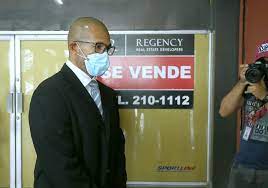Incoming Metro boss will collaborate in $91 million bribery probe
Hector Ortega
The newly named director-general and president of the board of directors of Metro de Panamá, SA, Héctor Ortega says that the company “will collaborate with any information that is required nationally or internationally. In the latest multi-million coma (bribery) investigations
“We will respect the investigations carried out by the competent authorities, “ he told La Prensa on Thursday, October 31.
He was referring to the case of the indictment in Spain of FCC Construcción for the alleged payment of bribes for the granting of contracts for the construction of Panama Metro and the City of Health.
According to the indictment of the National Court of Spain, three companies of the construction group - which is currently controlled by magnate Carlos Slim - paid 82 million euros ($91 million) to get public works contracts in Panama.
FCC was awarded in consortium with Brazil's Norberto Odebrecht the design and construction contracts of the first two lines of the Panama Metro for a total of $4.220 billion. The first was tendered during the administration of Ricardo Martinelli and the second in the government of Juan Carlos Varela.
The consortia were led by Brazil’s Odebrecht, but FCC had a 45% stake.
The Brazilian company confessed in 2016 that it paid $788 million in bribes in 12 countries, including Panama, to get public works contracts.
In addition, the Panama Public Ministry is investigating the Spanish construction company for the alleged commission of several crimes for works, such as the Vía Brasil corridor, also awarded in the Martinelli administration.
Ortega, who will replace Roberto Roy as the maximum representative of the Panama Metro, in January 2020, told La Prensa that the Public Procurement Law governs in Panama, defended the technical work of the evaluation commissions and announced that when he takes office It must ensure the transparency of the processes and the appointment of independent evaluation committees.
In the bill that reforms the Public Procurement Law, a new mechanism is established for the selection of the members of the evaluation commissions. According to the original proposal of the bill, the members will leave a database of professionals who will be in the General Directorate of Public Procurement.
The text, which will be discussed in the Assembly in extraordinary sessions, eliminates the tender model with a separate evaluation, used in the two Metro lines and that keeps the official price hidden in the tender.
